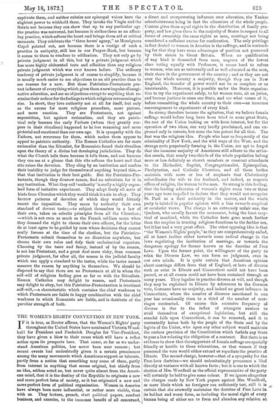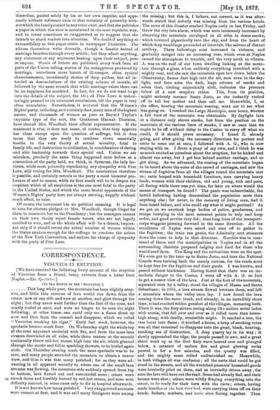throughout the United States have nominated Victoria Wood- hull for
President and Frederick Douglas for Vice-President, they have given a blow to their cause which will have a reflex action upon its prospects here. That cause, so far as we under- stand American politics, has never been near success ; but recent events had undoubtedly given it a certain prominence among the many movements which Americans support or tolerate, partly from a notion that something may come of them, partly from interest in anything that seems original, but chiefly from an idea, seldom acted on, but never quite absent from the Ameri- can mind, that it is the destiny of the Republic to originate a new and more perfect form of society, as it has originated a new and more perfect form of political organisation. Women in America have always been more influential, or rather more visible, than with us. They lecture, preach, start political papers, conduct business, and exercise, to the immense benefit of all concerned, • a direct and overpowering influence over education, the Yankee schoolmistresses being in fact the educators of the whole people. Custom gives them equal rights in the distribution of family pro- perty, and law gives them in the majority of States in respect to all forms of ownership the same rights as men, marriage not being considered a sufficient excuse for confiscation. The only privilege in fact denied to women in America is the suffrage, and in contend- ing for that they have some advantages of position not possessed by their sisters in Great Britain. When no qualification of any kind is demanded from men, negroes of the lowest class voting equally with Professors, it seems hard to refuse to women, who are as universally and as well educated as the men, their share in the government of the country ; and as they are not over the whole country a majority, though they are in New England, the transfer of power would not be so complete or so irretrievable. Moreover, it is possible under the State organisa- tion to try the experiment safely, to let women vote, sit on juries, and become justices in some one State, and see what comes of it, before committing the whole country to their care—an immense encouragement to experiments of every kind.
So strong therefore became the agitation, that we believe female suffrage would before long have been tried in some great State, the rest of the Union looking on with keen interest, but for the operation of two ideas, one very loudly proclaimed, and one ex- pressed only in corners, but none the less potent for all that. The first was the religious idea. People who hear so frequently of the criminality of New York, and the wild ways of the West, and the strange sects perpetually forming in the Union, are apt to forget that the immense majority of Americans still adhere to the ortho- dox creeds, that nearly two-thirds of the whole population belong more or less definitely as church members or constant attendants to the Methodist, Baptist, Congregationalist, Episcopalian, Presbyterian, and Catholic Churches, and all these bodies maintain with more or less of emphasis that Christianity subordinates the wife to the husband, and indeed, as respects offices of religion, the woman to the man. So strong is this feeling, that the leading advocates of women's rights some two or three years ago were impelled to declare that they would not recognise St. Paul as a final authority in the matter, and the whole party is tainted in popular opinion with a bias towards sceptical or secularist views. The charge is an extremely unfair one, the Quakers, who usually favour the movement, being the least scep- tical of mankind, while the Catholics have gone much farther than the sceptics in trusting religious functions to the feebler sex, but it has had a very great effect. The other opposing idea is that "the Women's Rights' people," as they are comprehensively called, all at heart incline either towards some radical change in the laws regulating the institution of marriage, or towards the dangerous apology for licence known as the doctrine of Free Love. Upon the former point, the willingness of the party to relax the Divorce Law, we can form no judgment, even in our own minds. It is quite certain that American opinion about marriage differs from that of England, or laws of divorce such as exist in Illinois and Connecticut could not have been passed, or at all events could not have been sustained through so many years. They legalise in practice divorce at will, and though they may be explained in Illinois by references to the German vote, Germans have no majority, and indeed no great influence in Connecticut, where the number of divorces sanctioned in one year has occasionally risen to a third of the number of mar- riages contracted. Of course this excessive frequency of divorce is due to the influx of strangers anxious to avail themselves of exceptional legislation, but still the scandal falls upon Connecticut, it can be removed, and it is contentedly borne both by the people of the State and by the legists of the Union, who upon any other subject would maintain the curious provision of the Constitution which forbids any State to pass a law relaxing the obligation of a contract. But there is no evidence to show that the supporters of female suffrage are specially friendly or hostile to these relaxations, or that women if they possessed the vote would either extend or repudiate the practice of Illinois. The second charge, however—that of a sympathy for the Free-love doctrine—we should unhesitatingly pronounce a libel directly at variance with all known facts ; but it is one to which the election of Mrs. Woodhull as the official representative of the party will certainly be held to give some colour. If we ignore altogether the charges made by New York papers against Mrs. Woodhull, as mere libels which no foreigner can sufficiently test, still it is 40 certain that she avowedly maintains the doctrine of Free Love in its boldest and worst form, as including the moral right of every human being of either sex to form and abandon any relation at
discretion, guided solely by his or her own impulse, and appa- rently without reference even to that certainty of paternity with- out which the family cannot in any sense exist; and that she publishes a paper in which this view is maintained in the most repulsive way, and in terms sometimes so exaggerated as to suggest that she intends to shock readers into attention. We doubt if anything so extraorditiary as this paper exists in newspaper literature. The editors themselves write decently, though a fauatic hatred of marriage breathes through every article ; but they admit anything,
any statement or any argument bearing upon their subject, pure or impure. Shoals of letters are published every week from all parts of the Union telling stories of the unhappiness produced by marriage, sometimes mere bursts of ill-temper, often cynical shamelessnesses, occasionally stories of deep pathos, but all in- tended as denunciations of the existing scheme of morals, all followed by the same remark that while marriage exists there can be no happiness for mankind. In fact, for we do not want to go into the details of the subject, the idea of Free Love is unhesi- tatingly pressed to its uttermost conclusions, till the paper is very often unreadable. Nevertheless, it is stated that the Women's Rights'party, including, as it certainly does, many men of the highest nature, and thousands of women as pure as Bayard Taylor's exquisite type of the sect, the Quakeress Hannah Thurston, have elected Mrs. Woodhull their official representative. if the statement is true, it does not mean, of course, that they approve her ideas except upon the question of suffrage, but it does mean that they are ready to condone views essentially hostile to the very theory of sexual morality, fatal to family life, and destructive to civilisation, in consideration of daring and able leadership towards their special end. Unless we are mistaken, precisely the same thing happened once before at a convention of the party held, we think, in Syracuse, the lady lec- turers, while most pointedly repudiating any sympathy with Free Love, still voting for Mrs. Woodhull. The nomination therefore is possible, and certainly reveals in the party a most immoral pre- ference of end to means, while its first result will be to deepen the suspicion which of all suspicions is the one most fatal to the party in the United States, and which the more brutal opponents of the Women's Rights' party here are always striving, happily without much effect, to raise.
Of course the movement has no political meaning. It is legal to vote for electors pledged to Mrs. Woodhull, though illegal for them to nominate her to the Presidency ; but the managers cannot on their own theory reject female voters, who are not legally entitled to vote, and so the whole affair will be a drama, import- ant only if it should reveal the actual number of women within the States anxious enough for the suffrage to condone the action of the New York Convention, and endure the charge of sympathy with the party of Free Love.



































 Previous page
Previous page